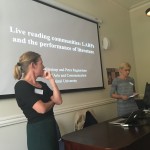The AHRC-funded Digital Reading Network will be hosting its first symposium on 19 June. The event will take place in the Executive Business Centre at Bournemouth University. All are welcome to attend this free event but please note that places are limited.
Bob Stein, a pioneer of electronic publishing and founder of the Institute for the Future of the Book, will be our keynote speaker. Bob will be discussing his latest venture, SocialBook, a new digital publishing platform which promises to take the idea of social reading to a new level.
The day will feature contributions from international scholars and practitioners drawing on a wide range of approaches and methods in an attempt to understand the momentous changes affecting readers and reading in the digital age.
Topics discussed will include
- Ebooks and ereaders
- Online book clubs and discussion forums
- Reading and social media
- Digital well being
- Artists’ books
- Digital comics
As well as scholarly papers, the day will include workshops, roundtable discussions, exhibitions and poster presentations.
Lunch and refreshments will be provided. Further details of the programme and travel and accommodation information are available on the DRN website (www.digitalreadingnetwork.com).
To register your place, please contact srose@bournemouth.ac.uk.
 Reading Communities: Past and Present – AHRC conference, Senate House, London
Reading Communities: Past and Present – AHRC conference, Senate House, London










 Nursing Research REF Impact in Nepal
Nursing Research REF Impact in Nepal Fourth INRC Symposium: From Clinical Applications to Neuro-Inspired Computation
Fourth INRC Symposium: From Clinical Applications to Neuro-Inspired Computation ESRC Festival of Social Science 2025 – Reflecting back and looking ahead to 2026
ESRC Festival of Social Science 2025 – Reflecting back and looking ahead to 2026 3C Event: Research Culture, Community & Cookies – Tuesday 13 January 10-11am
3C Event: Research Culture, Community & Cookies – Tuesday 13 January 10-11am Dr. Chloe Casey on Sky News
Dr. Chloe Casey on Sky News ECR Funding Open Call: Research Culture & Community Grant – Application Deadline Friday 12 December
ECR Funding Open Call: Research Culture & Community Grant – Application Deadline Friday 12 December MSCA Postdoctoral Fellowships 2025 Call
MSCA Postdoctoral Fellowships 2025 Call ERC Advanced Grant 2025 Webinar
ERC Advanced Grant 2025 Webinar Horizon Europe Work Programme 2025 Published
Horizon Europe Work Programme 2025 Published Update on UKRO services
Update on UKRO services European research project exploring use of ‘virtual twins’ to better manage metabolic associated fatty liver disease
European research project exploring use of ‘virtual twins’ to better manage metabolic associated fatty liver disease